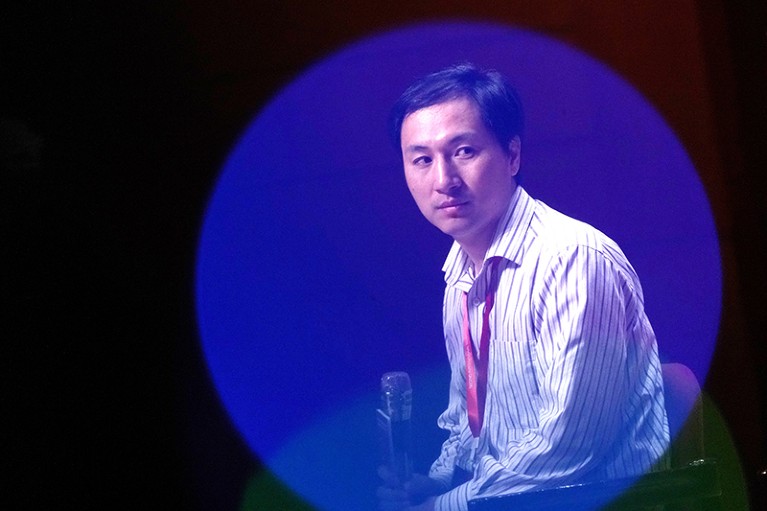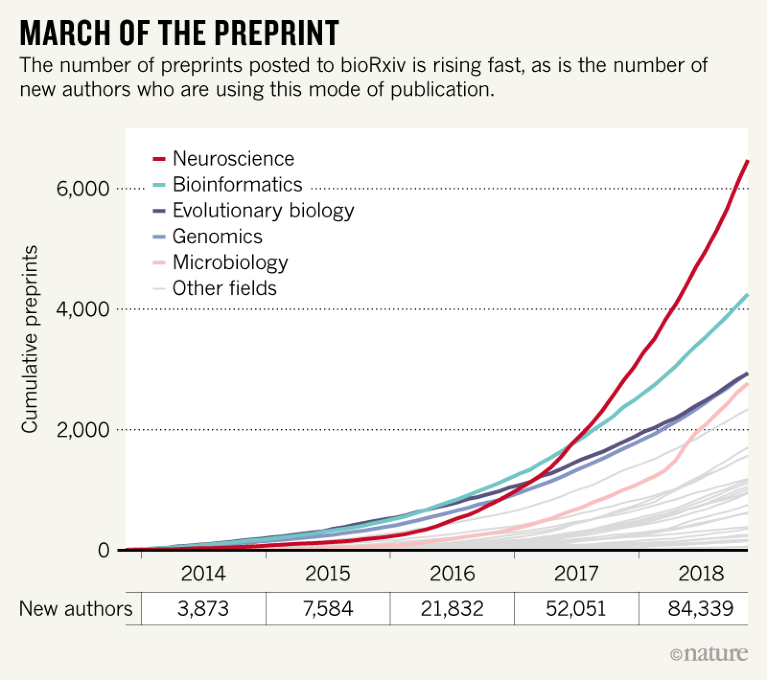EVENTS
Scientist behind gene-edited babies fired An investigation by a provincial health ministry in China has found that He Jiankui, the scientist who claimed to have created the world’s first genome-edited babies, broke national regulations against using gene editing for reproductive purposes, according to Chinese state media. An article on the Xinhua news website on 21 January also said that He (pictured) violated regulations forbidding the use of artificial reproduction techniques for people with HIV. Reports emerged last November that He had edited the genomes of twin girls in an effort to make them resistant to HIV infection, provoking international outcry. Xinhua did not mention any punishable crimes, but it said that police might now get involved. He’s university, the Southern University of Science and Technology in Shenzhen, fired him on 21 January. The Xinhua article was based on an interview with a member of the Guangdong province health ministry investigation team, which had been tasked to look into the He affair. He himself did not respond to Nature’s requests for comment.

He Jiankui lost his job at the university.Credit: Anthony Kwan/Bloomberg/Getty
ENVIRONMENT
Global threats Environmental and health concerns topped the charts for threats the world will face in 2019. In a report released on 16 January, the World Economic Forum placed extreme weather events, such as heat waves and floods, at the top of its list of global risks this year. Civilization’s failure to adapt to or curb the effects of climate change came in second. The World Health Organization (WHO) included the reluctance or refusal to vaccinate on its list of the top ten health threats. Measles is of particular concern, given that there was a 30% increase in cases globally between 2016 and 2017. Regions including the Americas and Europe saw the greatest resurgence of the disease in 2017, largely because of anti-vaccine sentiments, according to the WHO.
Ecology project The US government contractor that manages the National Ecological Observatory Network (NEON) has reversed its decision to disband the project’s scientific advisory board, following an outcry from researchers. Earlier this month, the contractor, Battelle of Columbus, Ohio, fired two long-time senior employees from the US$434-million project, which is funded by the National Science Foundation and is building a network of 80 observation sites across the United States. NEON’s chief scientist, Sharon Collinge of the University of Colorado Boulder, resigned in protest, and Battelle then disbanded the project’s 20-member board. Board members sent Battelle chief scientist Michael Kuhlman a letter of protest on 14 January, saying that the move “breeds mistrust” with the scientific community. On 17 January, Battelle reversed course. In an e-mail seen by Nature, Kuhlman apologized for what he called an “erroneous assumption” that advisory bodies would turn over during a leadership change.
PUBLISHING
German deal A consortium of German academic libraries that is seeking to make research papers more freely available has struck a deal with the publisher Wiley after almost two years of talks. The contract, signed on 15 January, combines the cost of accessing academic journals with some of the publishing charges that make researchers’ articles free to read. Previously, libraries made individual deals with publishers. The Project DEAL consortium, which represents around 700 research institutions and libraries in Germany, has been trying to broker this type of deal, known as a read and publish agreement, with major publishers since the group’s inception in 2015. The consortium is also engaged in negotiations with the large publishers Elsevier and Springer Nature. (Nature’s news team is editorially independent of its publisher Springer Nature.)
POLITICS
India protests On 16 January, police in New Delhi arrested about 800 research students who were demonstrating against low stipends. The students were among 2,000 protesting outside the Ministry of Human Resource Development in New Delhi, and others on campuses across India (pictured). PhD students who qualify for a government fellowship receive 25,000 rupees (US$350) a month for 2 years and 28,000 rupees thereafter — which the protesters say is too little to live on. The issue affects about 125,000 graduate students — known as research scholars — at government-funded institutes, including the elite Indian Institutes of Technology. A stipend increase promised by the government in 2018 did not materialize, and students say they receive payments irregularly. Some who have qualified for the programme since June 2017 say they have not received payments. More than 2,000 scholars have undertaken a ‘relay’ hunger strike until the government approves an 80% hike in the stipends.
Albania minister Albania’s education and science minister has been replaced in a government reshuffle amid weeks of mass student protests that brought the country’s public universities to a halt. For years, students have been complaining about growing privatization of education, which, they say, has hiked up fees without adding benefits. The government has now said that it will meet many of the students’ requests for cheaper and better-quality higher education, but it has stopped short of repealing a controversial 2015 law that protesters say is the source of many of the problems plaguing Albanian academia. The issues include a ban on starting new PhDs, lack of time and funding for research, and poor quality control. Lindita Nikolla, a mathematician who had been running the education ministry since 2013, offered her resignation before being replaced. However, universities have not resumed classes, and smaller-scale protests pushing for even more comprehensive reforms in academia continue.
FUNDING
Huawei concerns The University of Oxford, UK, will stop seeking research funding from the Chinese telecommunications company Huawei, in light of “public concerns raised in recent months surrounding UK partnerships” with the company, the university said. Since late 2018, Huawei, headquartered in Shenzhen, has been under mounting scrutiny from international governments over security concerns relating to its devices and involvement in nations’ telecommunications networks. The Times newspaper reported in December that UK defence secretary Gavin Williamson had voiced “very deep concerns” about Huawei’s involvement in upgrading the country’s mobile-phone network. In November, the US–China Economic and Security Review Commission, created by the US Congress, warned that the Chinese government’s strong influence over Chinese companies means that it could force them to modify products to fail, facilitate corporate espionage or compromise the confidentiality of equipment. Huawei did not respond to Nature’s requests for comment. Oxford is currently in receipt of £692,000 (US$890,000) from Huawei relating to two existing research projects, which will be unaffected. It said it will keep the funding ban under review.
FACILITIES
LIGO in India India will soon begin construction of a counterpart to the LIGO gravitational-wave observatory in the United States, after the construction site for the project received final approval. The observatory will cost 12.6 billion rupees (US$177 million) and is scheduled for completion in 2024. This extra detector will help to expand the area of sky from which gravitational waves can be detected, and will triangulate data to boost sensitivity and detection confidence. A team of scientists in India has been collaborating formally on the LIGO project with US researchers since 2016. In 2015, LIGO’s US detectors discovered gravitational waves — ripples in space-time, formed in this case by the collision of two black holes — whose existence was predicted by Albert Einstein.
TREND WATCH
A growing number of biologists are posting their papers to a major preprint server before publishing in peer-reviewed journals, according to an analysis of the 37,648 preprints posted on bioRxiv in its first 5 years.Both uploads and downloads of preprints in the biological sciences are at a record high, according to the analysis — which was itself posted on bioRxiv on 13 January (R. J. Abdill and R. Blekhman Preprint at bioRxiv https://doi.org/10.1101/515643; 2019). The study found that there were, on average, 1,711 preprints posted each month in the first 11 months of 2018, and the total number posted last year was more than those in the previous four years combined. It also found that there were 1.1 million downloads last October alone. The number of authors who were posting a preprint for the first time went up from 3,873 in 2014 to 84,339 in 2018. Most of the downloaded preprints are in the fields of neuroscience and bioinformatics, with evolutionary biology, genetics, genomics and microbiology also featuring in the top ten bioRxiv fields. Around 42% of these preprints have also been published in peer-reviewed journals.

Source: R. J. Abdill & R. Blekhman Preprint at bioRxiv https://doi.org/10.1101/515643 (2019).



